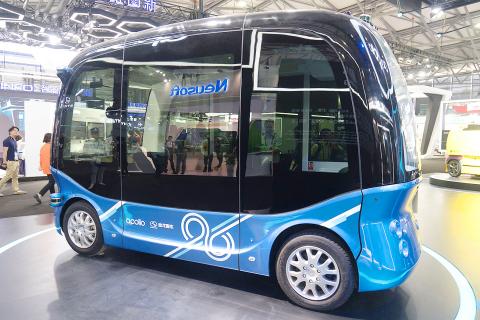Chinese Internet giant Baidu Inc (百度) yesterday announced that it had begun mass producing the country’s first autonomous mini-bus, as the firm prepares to roll them out in tourist spots and airports.
Chief executive officer Robin Li (李彥宏) watched the 100th vehicle roll off a production line of a factory in the southeastern city of Xiamen.
This year “marks the first year of commercialization for autonomous driving. From the mass production of Apolong, we can truly see that autonomous driving is making great strides — taking the industry from zero to one,” Li said.

Photo: AFP
The 14-seater Apolong, about one-third of the size of a normal bus, has no steering wheel, driver’s seat, accelerator or brake.
Coproduced by Baidu and Chinese bus manufacturer Golden Dragon Bus Co (金龍客車), they are soon to be pressed into commercial use in enclosed areas such as tourist areas and airports in several cities including Beijing, Guangzhou, Shenzhen, and the country’s new megacity Xiong’an.
Early next year, they are set to enter Japan’s self-driving market as shuttle buses at nuclear power stations or to ferry around elderly people in local communities in Tokyo.
The vehicles have the “fourth level” of automation as defined by the Society of Automotive Engineers, meaning that they can operation within an enclosed location without human intervention.
This is one short of the highest level, where vehicles can operate anywhere on the road.
“I took a self-driving car to come to the developer conference last year, and ended up getting a ticket at [Beijing’s] fifth ring road,” Li said.
Often referred to as China’s Google, Baidu operates the country’s leading search engine and also invests heavily in services ranging from online payments to connected devices and artificial intelligence.
“In the past, China exported cheap commodities to the world. In the future, China will export AI [artificial intelligence] technology to the world,” Li said at the firm’s annual AI developer conference.
At the conference, he also announced a new AI chip called Kunlun, which can support a wide range of AI applications including voice recognition, natural language processing and autonomous driving.

The Eurovision Song Contest has seen a surge in punter interest at the bookmakers, becoming a major betting event, experts said ahead of last night’s giant glamfest in Basel. “Eurovision has quietly become one of the biggest betting events of the year,” said Tomi Huttunen, senior manager of the Online Computer Finland (OCS) betting and casino platform. Betting sites have long been used to gauge which way voters might be leaning ahead of the world’s biggest televised live music event. However, bookmakers highlight a huge increase in engagement in recent years — and this year in particular. “We’ve already passed 2023’s total activity and

Nvidia Corp CEO Jensen Huang (黃仁勳) today announced that his company has selected "Beitou Shilin" in Taipei for its new Taiwan office, called Nvidia Constellation, putting an end to months of speculation. Industry sources have said that the tech giant has been eyeing the Beitou Shilin Science Park as the site of its new overseas headquarters, and speculated that the new headquarters would be built on two plots of land designated as "T17" and "T18," which span 3.89 hectares in the park. "I think it's time for us to reveal one of the largest products we've ever built," Huang said near the

China yesterday announced anti-dumping duties as high as 74.9 percent on imports of polyoxymethylene (POM) copolymers, a type of engineering plastic, from Taiwan, the US, the EU and Japan. The Chinese Ministry of Commerce’s findings conclude a probe launched in May last year, shortly after the US sharply increased tariffs on Chinese electric vehicles, computer chips and other imports. POM copolymers can partially replace metals such as copper and zinc, and have various applications, including in auto parts, electronics and medical equipment, the Chinese ministry has said. In January, it said initial investigations had determined that dumping was taking place, and implemented preliminary

Intel Corp yesterday reinforced its determination to strengthen its partnerships with Taiwan’s ecosystem partners including original-electronic-manufacturing (OEM) companies such as Hon Hai Precision Industry Co (鴻海精密) and chipmaker United Microelectronics Corp (UMC, 聯電). “Tonight marks a new beginning. We renew our new partnership with Taiwan ecosystem,” Intel new chief executive officer Tan Lip-bu (陳立武) said at a dinner with representatives from the company’s local partners, celebrating the 40th anniversary of the US chip giant’s presence in Taiwan. Tan took the reins at Intel six weeks ago aiming to reform the chipmaker and revive its past glory. This is the first time Tan